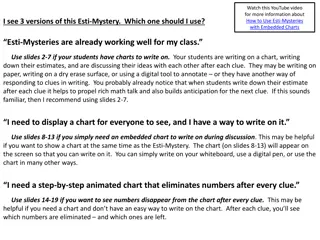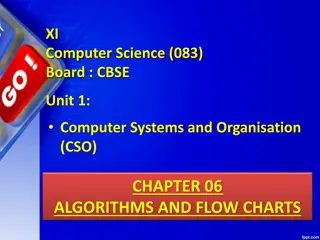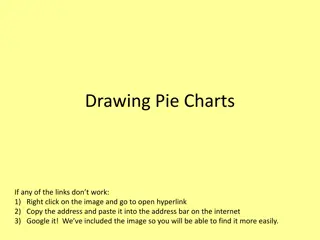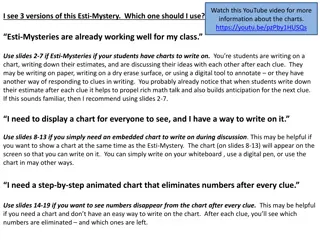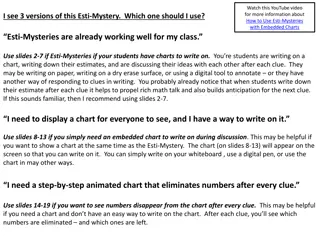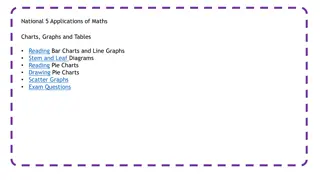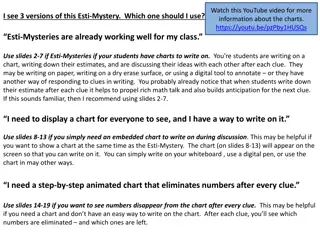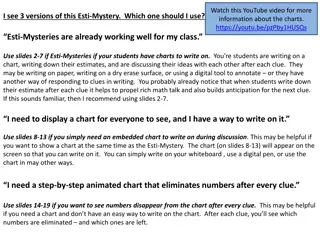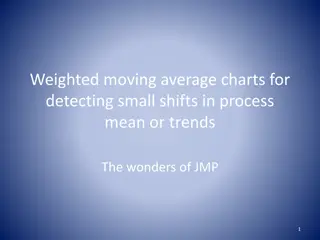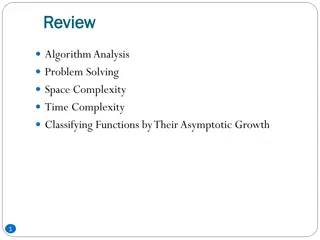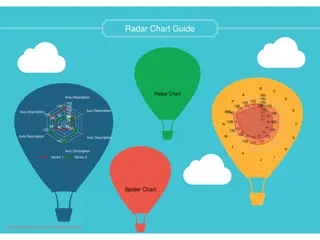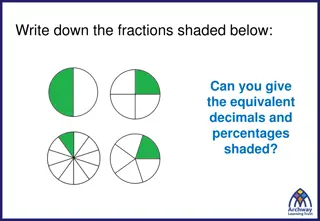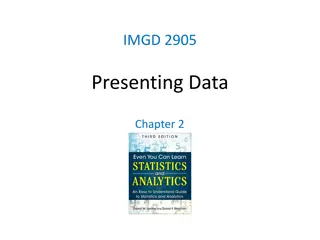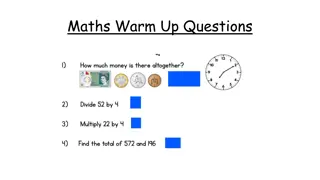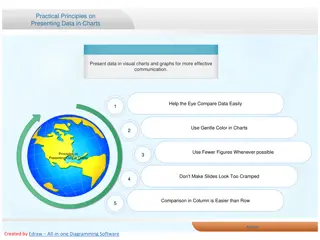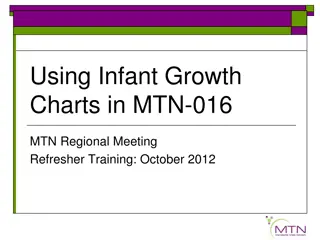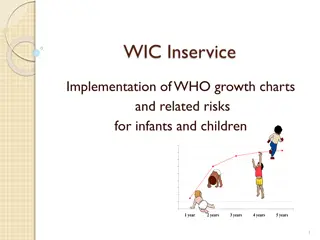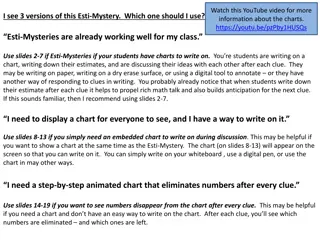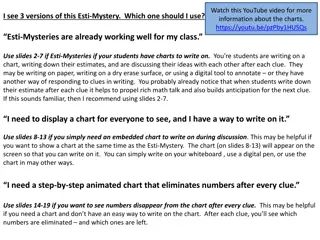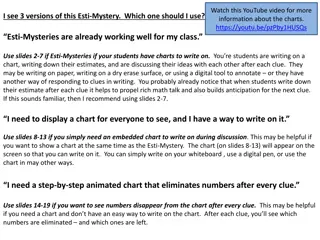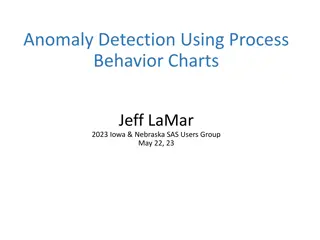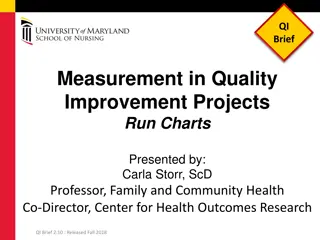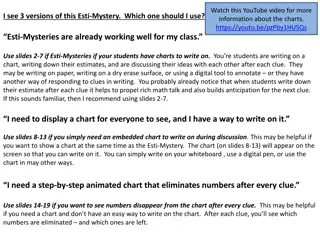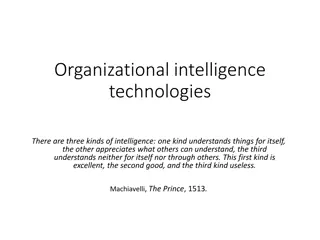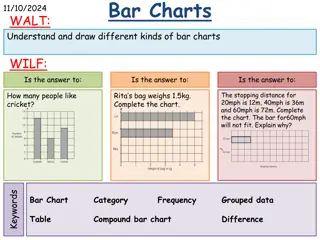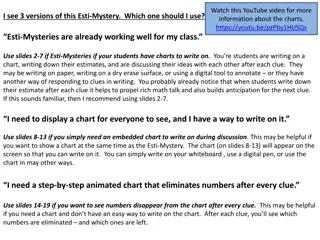Understanding How to Read a Load Chart for a 100-ton Crane
Load charts are essential for determining safe lifting capacities of cranes in construction and heavy machinery operations. This guide explains how to interpret load charts based on factors like boom length, operating radius, and load weight, ensuring safe and efficient crane operations. Learn to id
5 views • 7 slides
Exciting Ways to Use Esti-Mysteries with Embedded Charts
Explore three versions of Esti-Mysteries to engage students in writing estimates, discussing ideas, and using charts dynamically. Choose the version that best suits your classroom needs and enhance math discussions and anticipation for the next clue. Utilize slides with charts for writing, embedded
8 views • 19 slides
Electrical Engineering Depth Charts 2021-2022
This catalog showcases various depth charts in the field of Electrical Engineering for the academic year 2021-2022. The depth charts cover a range of topics including electric energy, electromagnetic fields, solid-state devices, bio-electrical systems, electronic circuits, and communication systems.
0 views • 11 slides
Understanding Algorithms and Flow Charts in Computer Science: A Comprehensive Overview
Learn about the fundamentals of algorithms and flow charts in computer science with a focus on problem-solving techniques, algorithm definition, flow chart symbolism, and conversion between algorithms and flow charts. Explore the intelligence characteristics that set humans apart, illustrated throug
0 views • 62 slides
Pie Chart Construction and Interpretation Tips
Learn how to draw pie charts, understand important data vocabulary, and analyze pie chart results with practical examples. Explore ways to present and measure data effectively using pie charts. Discover online resources for drawing pie charts even without a compass or protractor. Gain insights into
1 views • 10 slides
Interactive Esti-Mystery Charts for Engaging Math Learning
Explore three versions of Esti-Mystery charts to enhance math learning in your classroom. From writing on charts to animated step-by-step elimination, these tools support rich math discussions and student engagement. Choose the version that suits your teaching style and watch your students dive into
0 views • 19 slides
Interactive Esti-Mysteries with Embedded Charts for Engaging Math Activities
Explore the three versions of Esti-Mysteries and discover which one suits your classroom best. Enhance math discussions by using embedded charts where students write down their estimates and engage in collaborative problem-solving. Choose from different slide sets based on your classroom setup and t
0 views • 19 slides
National 5 Applications of Maths: Charts, Graphs, and Tables Examples
Explore various examples related to reading bar charts, line graphs, stem-and-leaf diagrams, pie charts, and constructing stem-and-leaf charts in the context of National 5 Applications of Maths. Practice interpreting data from tables, line graphs, and stem-and-leaf diagrams to enhance your understan
0 views • 18 slides
Mastering Financial Presentation with Charts
Learn how to effectively present financial results and analysis like a pro using various types of charts such as waterfall charts, stacked bar charts, and mekko charts. Understand how to interpret income statements, identify areas for improvement, compare trends over time, and showcase budget growth
1 views • 21 slides
Interactive Esti-Mystery Charts for Engaging Math Discussions
Explore three versions of Esti-Mystery charts to engage students in rich math discussions. Choose the slides based on your class's needs: for writing on charts, embedded charts for discussion, or an animated chart that eliminates numbers. Follow the clues, make estimates, and narrow down possibiliti
0 views • 19 slides
Interactive Esti-Mystery Charts for Engaging Math Lessons
Explore different versions of Esti-Mystery charts to engage students in rich math discussions. Choose from slides for writing on charts, embedded charts for discussion, or animated charts that eliminate numbers. Follow clues to estimate the number of beads in a glass and narrow down possibilities. E
0 views • 19 slides
Understanding the Importance of Flow Charts in System Processes
Flow charts are valuable tools that visually represent the flow of data and process steps within a system. They help define problems, sequence steps to solve them, and show alternatives if issues arise. By using standard symbols, flow charts facilitate communication between engineers and clients, ai
1 views • 35 slides
Fiji Hydrographic Office Overview
Lieutenant Jervis Robinson, a Senior Hydrographic Surveyor at the Fiji Hydrographic Office, provided insights into the roles and responsibilities of the office in collecting, processing, and disseminating georeferenced data related to maritime navigation, marine resources, and environmental preserva
1 views • 23 slides
Understanding Operations Management and Organizational Functions
Operations Management involves creating value through the transformation of inputs into goods and services. Essential organizational functions like marketing, production, finance, and accounting contribute to the efficient production of goods and services. Various industries utilize organizational c
0 views • 41 slides
Understanding Weighted Moving Average Charts for Process Monitoring
Weighted moving average charts are powerful tools for detecting small shifts and trends in process means. By utilizing Uniformly Weighted Moving Average (UWMA) charts and Exponentially Weighted Moving Average (EWMA) charts, organizations can monitor and identify changes in process means with precisi
1 views • 29 slides
Overview of Attribute Control Charts in Quality Management
Attribute control charts are used in quality management to monitor the conformity of products or services based on specific characteristics. Unlike variable charts, attribute charts categorize items as conforming or non-conforming. This summary discusses the importance of attribute charts, focusing
0 views • 71 slides
Understanding Pseudo Code and Flow Charts for Algorithm Analysis
Explore the concepts of pseudo code and flow charts for analyzing algorithms, problem-solving, and understanding space and time complexity. Learn about basic elements of pseudo code, assigning operations, and writing effective pseudo code statements in a clear and structured manner. Discover the imp
0 views • 26 slides
Complete Guide to Radar Charts: Benefits, Drawbacks, and Tips
Radar charts, also known as spider charts, offer a graphical way to compare data in a web-like form, making it easy to evaluate multiple alternatives based on various criteria. While radar charts have benefits like highlighting strengths and deficiencies clearly, they also come with drawbacks such a
0 views • 12 slides
Understanding Pie Charts with Fractions, Decimals, and Percentages
Explore pie charts through shaded fractions to decimals and percentages. Answer questions about people's color choices, fractions, and representations in pie charts. Learn about different representations and how they relate to percentages, decimals, and fractions.
0 views • 25 slides
Understanding Charts for Data Visualization in Excel 2016
Charts in Excel 2016 are powerful tools for visually representing quantitative data, helping to convey patterns, trends, and comparisons effectively. This guide covers the purpose of charts, avoiding chart junk, different types of charts like Column, Bar, Line, and more, and their specific uses in d
0 views • 17 slides
Data Presentation Techniques for Effective Communication
Explore various data presentation methods including charts, tables, and graphs to effectively communicate data insights. Learn about different types of charts, their uses, and guidelines for creating impactful visual representations. Dive into examples of bar charts, pareto charts, and pie charts to
1 views • 34 slides
Enhancing Understanding of Graphs and Charts for English Class X Students
Explore the world of graphs and charts in English class X with detailed lessons on identifying chart types, describing charts both orally and in writing. Get familiar with key words and phrases to interpret data fluctuations and learn through practical examples depicting changes in workload and stud
0 views • 10 slides
Understanding Bar Charts and Pictograms in Mathematics
Bar charts and pictograms are visual ways to represent data. It is essential to interpret the key and scale correctly to derive accurate information from the charts. Pay attention to details and calculations to analyze the data effectively.
0 views • 10 slides
Best Practices for Effective Data Presentation in Charts
Present data effectively using visual charts and graphs by following principles such as using gentle colors, using fewer figures, avoiding cramped slides, and utilizing bar and plot charts for easy data comparison. Make sure to consider color choices, digit simplification, slide spacing, and data cl
0 views • 7 slides
Interactive Esti-Mystery Charts for Engaging Math Discussions
Dive into the world of Esti-Mystery charts to enhance math discussions in your classroom. Choose the right version based on your needs, whether it's writing on a chart, using embedded charts, or animated charts. Follow the clues, make estimations, and encourage strong mathematical reasoning. Empower
0 views • 19 slides
Understanding Infant Growth Charts in MTN-016 for Effective Monitoring
Infant growth charts are essential tools used to monitor a child's growth trajectory over time. MTN-016 utilizes WHO growth standards for infants up to one year. Learn how to accurately use growth charts, adjust for gestational age, interpret percentile curves, and describe plotted points. These cha
0 views • 27 slides
Implementation of WHO Growth Charts for Infants and Children
Growth charts are essential for assessing children's growth, with WHO setting international standards since 2006. The discussion includes interpreting growth charts, the history of growth references, and the difference between reference and standard growth. It compares CDC's U.S. growth reference to
0 views • 30 slides
Engaging Math Activity: Esti-Mystery Whistle Challenge
Explore the Esti-Mystery Whistle Challenge where students make estimates, write them down, and discuss their ideas based on clues provided. Choose the version that suits your class best - with slides for writing on charts, embedded charts for discussion, or animated charts for number elimination. Na
0 views • 19 slides
Early Recognition of the Deteriorating Child with Complex Needs Study
This study explores the potential benefits of using individualized Pediatric Early Warning Score (PEWS) charts for children with complex neurological disabilities admitted with infections. By comparing standard age charts with patient-specific values, the aim is to improve specificity in recognizing
0 views • 11 slides
Interactive Esti-Mystery Charts for Rich Math Talk
Explore different versions of Esti-Mysteries to enhance math discussions in your class. Choose the version that best suits your needs, whether it's writing on charts, using embedded charts, or animated charts that eliminate numbers after each clue. Engage students in estimating bead counts and narro
0 views • 19 slides
Understanding Exponentially Weighted Moving Average Control Charts
Exponentially Weighted Moving Average (EWMA) control charts offer an effective alternative to Shewhart control charts for detecting small shifts in processes. This article explores the definition, properties, and calculations involved in EWMA control charts, providing insights on using this method i
0 views • 28 slides
DLR.de Charts Overview: SWIMming in Tcl by Frank Morlang
Explore a series of DLR.de charts touching on topics like space traffic, air traffic integration, and System Wide Information Management (SWIM). Dive into discussions on future challenges and provocations in the aviation industry, offering insights and motivations for the future. These charts provid
0 views • 28 slides
Interactive Esti-Mystery Chart Activity
Explore different versions of Esti-Mystery charts and choose the one that best suits your classroom needs. From writing on physical charts to using animated elimination charts, this activity encourages estimation, critical thinking, and collaborative discussions among students. Follow the clues, nar
0 views • 19 slides
Anomaly Detection Using Process Behavior Charts
Explore the philosophy behind understanding variation and key principles in anomaly detection using process behavior charts. Learn about preparing data, creating SAS charts, running tests for special causes, and executing a plan for anomaly detection and reporting processes. The material draws heavi
0 views • 41 slides
Understanding Run Charts in Quality Improvement Projects
Run charts are essential tools in quality improvement projects, allowing the tracking of data points over time to identify signals of improvement or degradation. They are used in the MAP-IT QI process to assess historical metrics before planning improvements. This brief provides insights on when to
0 views • 12 slides
Engaging Esti-Mystery Math Activity: Interactive Charts and Clues
Dive into the world of Esti-Mystery with this engaging math activity using interactive charts and clues. Choose the version that best suits your classroom - whether it's writing on charts, discussing ideas, or using animated charts. Follow the clues, eliminate numbers, and make estimations to uncove
0 views • 19 slides
Understanding Organizational Intelligence Technologies
Organizational intelligence technologies involve three kinds of intelligence - understanding independently, appreciating what others can understand, and understanding neither for itself nor through others. This concept emphasizes the importance of collecting, storing, processing, and interpreting da
0 views • 47 slides
Understanding Different Types of Bar Charts with Examples
Explore the world of bar charts through various examples such as favorite subjects, animals, and sports, along with practical exercises. Learn to interpret and draw different types of bar charts like compound, comparative, and composite charts. Discover how to represent data visually and analyze key
0 views • 9 slides
Understanding Control Charts: Tools for Process Monitoring
Control charts are essential tools in statistical process control systems. They help distinguish between natural and assignable variations in a process. By monitoring sample statistics and setting control limits, organizations can detect issues and take corrective actions promptly. This comprehensiv
1 views • 24 slides
Interactive Esti-Mystery Charts for Classroom Engagement
Explore three versions of the Esti-Mystery activity to engage students in chart estimation and math discussions. Choose from options with writable charts, embedded charts, or animated charts to enhance the interactive learning experience. Follow clues, narrow down possibilities, make estimations, an
0 views • 19 slides

